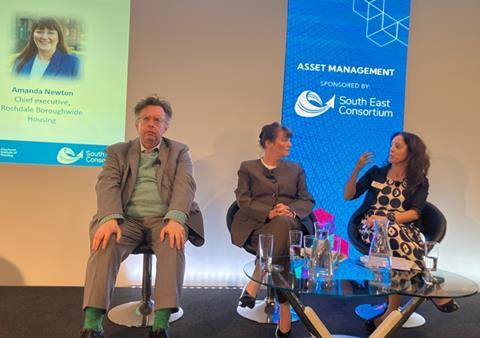Amanda Newton spoke at Awaab’s Law panel discussion alongside Housing Ombudsman
Rushing into using AI to perform housing jobs could have “catastrophic” consequences, according to Rochdale Boroughwide Housing’s chief executive.

Speaking at the Chartered Institute of Housing’s Housing Brighton conference this morning, Amanda Newton said: “I’m really clear with my teams that no technology replaces human sentience. It just doesn’t. We are a people business, and we’re dealing with people, and technology will only ever be an enabler.
“I actually think we’re in a position of quite high risk at the moment, as people get all excited about things like ChatGPT and AI and those things doing our jobs for us. We have to roll back from that until we’re confident that we’re not going to do something that will create another situation that is catastrophic by removing human sentience from those processes.”
Newton was part of a panel discussion about how the sector is preparing for the implementation of Awaab’s Law, which will come into force this October.
She stepped up to lead the housing association in 2023, a year after it was revealed that two-year-old Awaab Ishak died from black mould exposure in a Rochdale Boroughwide home.The landlord regained regulatory compliance at the end of last month.
Also on the panel was Richard Blakeway, Housing Ombudsman, who suggested that technology can be used to improve knowledge and information management within the sector, but that it can only be “part of the response”.
He said: “The technology will only be as good as the information that the landlord has. If the primary information is wrong, then the technology will return the wrong answers, or turn something in the wrong direction.”
More from Housing Brighton
Blakeway also described data and information management as a “cultural issue”.
He added: “There’s got to be a recognition that the record made by an operative in a resident’s home has profound implications that go all the way to the landlord’s 30-year budget planning in the boardroom. And therefore, there needs to be a real focus on the culture of data management and quality control.”
He also sees technology as an “enabler” that can make it easier to record and access information on a system and stressed the importance of “connecting the dots” between different data entries.
He explained that during investigations into complaints, landlords often provide insufficient data about a resident’s vulnerabilities and circumstances, describing a “mismatch” between the information recorded and that provided by a tenant.











No comments yet